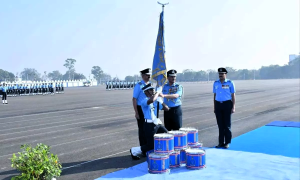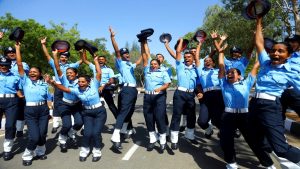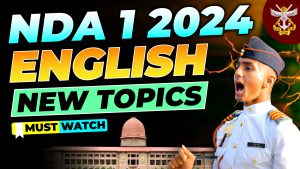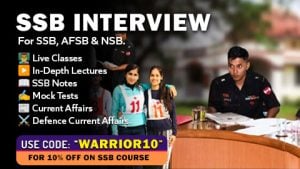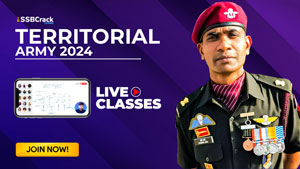In the dynamic and competitive landscape of the National Defence Academy (NDA), Combined Defence Services (CDS), and Air Force Common Admission Test (AFCAT) examinations, language proficiency plays a pivotal role. Among the various segments assessing English language skills, the topic of “Antonyms” emerges as a critical area. This article delves into the importance of mastering antonyms in these esteemed examinations and provides insights into the strategies that can be employed to excel in this essential aspect of language evaluation.
Directions: In the following questions, out of the four alternatives, choose the one which best expresses the opposite meaning of the given word.
Q) Dense
(A) Scarce
(B) Slim
(C) Sparse
(D) Lean
Ans. (c)
Q) Parsimonious
(A) Prodigious
(B) Selfless
(C) Extravagant
(D) Ostensible
Ans. (c)
Q) Harmony
(A) Strife
(B) Annoyance
(C) Cruelty
(D) Mischief
Ans. (a)
Q) Conciliation
(A) Dispute
(B) Separation
(C) Irritation
(D) Conformation
Ans. (a)
Q) Myth
(A) Truth
(B) Fact
(C) Falsehood
(D) Story
Ans. (b)
Q) Reluctantly
(A) Happily
(B) Satisfactorily
(C) Willingly
(D) Pleasingly
Ans. (c)
Q) Lament
(A) Rejuvenate
(B) Rejoice
(C) Complain
(D) Cry
Ans. (b)
Q) Animosity
(A) Love
(B) Luck
(C) Lust
(D) Lost
Ans. (a)
Q) Altercation
(A) Explanation
(B) Challenge
(C) Compromise
(D) Opposite
Ans. (c)
Q) Graceful
(A) Awkward
(B) Ignorant
(C) Slow
(D) Disloyal
Ans. (a)
For more questions, check out NDA CDS AFCAT 1 2024 Exam English Antonyms Class 4
Understanding Antonyms
Antonyms, in the context of language, refer to words that convey opposite meanings. The ability to identify antonyms is a testament to a candidate’s vocabulary, contextual understanding, and linguistic precision.
The Significance of Antonyms in NDA, CDS, and AFCAT Exams
- Contextual Decoding: Antonym-based questions require candidates to decode the meaning of words within specific contexts. This skill is valuable in comprehending military documents, instructions, and orders accurately.
- Vocabulary Precision: Mastering antonyms contributes to a refined and nuanced vocabulary. Officers in the armed forces are often required to communicate with clarity and precision, making a robust vocabulary indispensable.
- Critical Thinking Skills: The evaluation of antonyms demands critical thinking. Candidates must analyze the given word in context and select its opposite, showcasing their ability to think analytically and make strategic decisions.
- Leadership Communication: Effective communication is a cornerstone of leadership. Proficiency in antonyms reflects an aspirant’s capacity to express ideas and commands clearly, a trait essential for military leadership roles.
- Enhanced Comprehension: A thorough grasp of antonyms enhances an aspirant’s overall language comprehension. This proficiency is crucial in understanding complex military strategies, tactics, and communications.
Strategies for Mastering Antonyms
- Contextual Analysis: Understand the context in which a word is used to accurately determine its opposite meaning.
- Thematic Grouping: Group antonyms thematically to facilitate better retention and application of contrasting word pairs.
- Regular Practice: Engage in regular practice sessions and exercises focusing on antonyms to hone your skills effectively.
- Synonym-Antonym Relations: Develop an understanding of synonym-antonym relationships to comprehend word meanings in diverse contexts.
- Reading Comprehension: Regular reading exposes candidates to a wide range of words, including their antonyms, contributing to a holistic language learning experience.
- Vocabulary Expansion: Actively learn new words and their antonyms to continually enhance your vocabulary.
- Flashcard Utilization: Create flashcards containing words and their antonyms to aid in memory retention and quick revision.
Conclusion
The mastery of antonyms is not merely a test requirement; it is a gateway to developing essential skills that align with the demands of a career in the armed forces. Aspirants should approach antonym-based questions not only as a means to succeed in examinations but also as an opportunity to refine their language proficiency, critical thinking abilities, and communication skills—attributes crucial for effective military leadership. Recognizing the significance of antonyms is a step toward becoming a well-rounded and proficient officer, equipped to navigate the challenges and responsibilities inherent in the NDA, CDS, and AFCAT examinations, and beyond.


